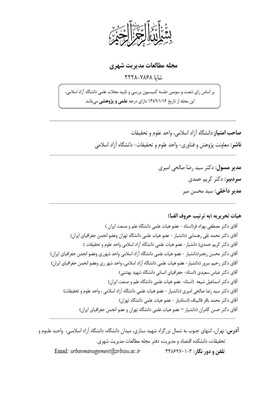تأثیر شهرنشینی بر مصرف انرژی در گروه کشورهای منتخب
محورهای موضوعی : مطالعات مدیریت شهریپروانه سلاطین 1 , سمانه محمدی 2
1 - استاد
2 - دانشجو
کلید واژه: شهرنشینی, مصرف انرژی, اثرات ثابت, گشتاور تعمیم یافته,
چکیده مقاله :
مقدمه و هدف پژوهش: امروزه انرژی و کاربرد آن در زندگی بشر از جایگاه ویژه ای برخوردار است. انرژی لازمه و پیش نیاز پیشرفت اجتماعی و توسعه اقتصادی است و نیاز حیاتی انسان به آب، غذا و سرپناه را تأمین می کند. در دهههای اخیر تقاضا برای انرژی به عنوان نهاده ای مهم و استراتژیک در تولید کالا و خدمات و نیز به عنوان کالایی ضروری برای مصرف کنندگان، به شدت افزایش یافته است. در این راستا هدف اصلی این مقاله بررسی ارتباط تئوریک و میزان تاثیرگذاری شهرنشینی بر میزان مصرف انرژی در گروه کشورهای منتخب صادرکننده نفت می باشد. روش پژوهش: تحقیق حاضر یک تحقیق کاربردی، تطبیقی، علّی و از نظر شیوه نگرش پرداختن به مسأله استنباطی است. یافتهها: نتایج حاصل از برآورد مدل به روش اثرات ثابت و گشتاور تعمیم یافته درگروه کشورهای منتخب در دوره زمانی 2012-2000 نشان می دهد شهرنشینی تاثیر مثبت و معناداری بر میزان مصرف انرژی درگروه کشورهای منتخب دارد. نتیجه گیری: دلیل اصلی افزایش مصرف انرژی به دنبال بروز پدیده شهرنشینی، تغییر الگوی مصرفی مردم، افزایش تقاضای کالاها و خدمات و درنتیجه افزایش مقیاس تولید و همچنین افزایش مصرف انرژی در بخش حمل ونقل میباشد.
Introduction and objective: Today, energy and its applications have a special place in human’s life. Energy is the prerequisite of social and economic growth and meets the need for drinking water, food and shelter. In recent decades the energy demand has risen as an important strategic input for production and services and as a significant commodity for users in itself. So, the main objective of the present paper is investigation of the theoretical relationship and the effectiveness of urbanism on energy consumption in selected oil-exporting countries. Method: This is an applied, comparative and causative research in terms of methodology and an inferential one in terms of writing method. Findings: The results from fixed effects methodology and Generalized Method of Moments in selected countries during 2000-2012 show that urbanism has a positive and significant effect on energy consumption in selected countries. Conclusion: The main reasons behind higher energy consumption in urbanism have been consumption pattern changes, higher commodity and services demand, and therefore, higher production and transportation, needing more energy.
آرمن، سید عزیزو زارع، روح الله،1388، مصرف انرژی در بخش های مختلف و ارتباط آن با رشد اقتصادی در ایران، فصلنامه ی مطالعات اقتصاد انرژی، سال ششم، شماره 21، صص 67-92.
اوبرای، ا.س (1942)، ترجمه فرهنگ و ارشاد، مهاجرت، شهرنشینی و توسعه. انتشارات مؤسسهی کار و تامین اجتماعی، تهران.
بهبودی، داود، اصغرپور، حسین و قزوینیان، محمد حسن، 1388، شکست ساختاری، مصرف انرژی و رشد اقتصادی ایران (1346- 1384)، پژوهش های اقتصادی، سال نهنم، شماره سوم، صص 84-53.
بهبودی، داود، محمدزاده، پرویز و جبرائیلی، سودا (1388)، بررسی رابطه ی مصرف انرژی و تولید ناخالص داخلی در کشورهای در حال توسعه و توسعه یافته، فصلنامه مطالعات اقتصاد انرژی، سال ششم، شماره 23، صص 1-21.
عیسیزاده، سعید و مهرانفر، جهانبخش(1391). بررسی ارتباط میان مصرف انرژی و سطح شهرنشینی در ایران. فصلنامه راهبرداقتصادی.2(1):70-47.
فطرس، محمد حسن، قربان سرشت، مرتضی(1391). اثر رشد شهرنشینی بر مصرف انرژی و انتشار دیاکسید کربن. فصلنامه مطالعات اقتصاد انرژی.35(9):168-147.
فطرس، محمد حسن و ترکمنی، اسماعیل 1393، مصرف انرژی، مصرف الکتریسیته و توسعه انسانی در ایران، مطالعات اقتصادی کاربردی ایران، سال سوم، شماره 10، 127-144.
قنبری، علی وهمکاران(1391) بررسی ارتباط بین مصرف انرژی و شهرنشینی در ایران با به کارگیری روش ARDL. فصلنامه مطالعات اقتصاد انرژی.35(9):119-101.
کورا، چارلز(1384). شهرنشینی در جهان سوم منظر جدید. ترجمهی دکتر فریبا قرائی. انتشارات دانشگاه هنر. تهران.
صادقی، سید کمال، صنوبر، ناصر، بهبودی، داود و دهقانی، علی، 1388، رابطه بین مصرف انرژی و تولید در بخش صنعتی ایران، مدلسازی اقتصادی، سال ششم، شماره 1، صص 91-110.
Cheng, S. B. , Lai, T. W. , (1997). An Investigation of Cointegration and Causality between Energy Consumption and Economic Activity in Taiwan Province of China. Energy Economics, 19, 435– 444.
Derek Byerlee, "Rural-urban migration in Africa:Theory,policy,and research im-plications. "International migration Review 3(winter 1974):553.
Dias Rubens A, Mattos Cristiano R, Balestieri José AP (2006); The limits of human development and the use of energy and natural resources; Energy Policy, Vol.34, 1026-1031.
Ehrlich, P.R., Ehrlich, A.H., (2004). One with Nineveh: Politics, Consumption, and the Human Future Island Press, Washington, DC.
Ewing R, Rong F. Ewing R, Rong F. (2008). "The Impact of Urban form on U.S. Residential Energy Use", Housing policy debate, 19(1), pp.1–30.
Fatai, K. et al. (2004). Modeling the causal relationship between energy consumption and GDP in New Zealand, Australia, India, Indonesia, The Philippines and Thailand, Mathematics and Computer in Simulation 64, 431- 445.
Hoonu, Seung,(2005),Energy consumption and economic growth evidence frome Korea, Energy Policy, No 33, PP. 1627 -1632.
Jones DW. (1989). "Urbanization and energy use in economic development",Energy journal, 10(1), pp. 29–44.
Jones DW. (2004). "Urbanization and Energy", RCF economic and financial consulting Inc. Chicago, United tates.
Kakar, K. Khilji, B. & M. Khan (2011). "Financial Development and Energy Consumption: Empirical Evidence from Pakistan", International Journal of Trade, Economics and Finance, Vol. 2, No. 6.
Kazim A.M, (2007). Assessments of Primary Energy Consumption and its Environmental Consequences in United Arab Emirates, Renewable and Sustainable Energy Reviews, 11, 426-446.
Nadia S, Ouedraogo ( 2013); Energy consumption and Human Development: Evidence from a panel cointegration and error correction model; Energy, Vol. 63, 28-41.
Shahbaz, M. & H. Lean (2012). "Does Financial Development Increase Energy Consumption? The Role of Industrialization and Urbanization in Tunisia", Energy Policy, Vol. 40, PP. 473-479.
Sundusky,p.(2009)," Renewable Energy Consumption and Income in Emerging Econoomics", Energy Economics, No.15, pp.137-150.
Tol ,s.j. W.R. pacala & S.R.socolow(2006). underast anding long-term Energy use and carbon dioxide Emissions in the usa.Humborg university.
www. Worldbank.org.
http://www.eia.gov/cfapps/ipdbproject/IEDIndex3.cfm


